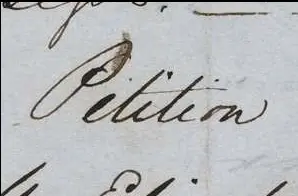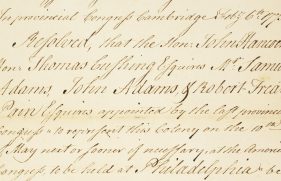To the Honorable the Senate and House of Representatives of the United States of America.
In the last testament of my much lamented Husband, General Alexander Hamilton, all his public and private papers were bequeathed to me, for publication, as the only unarming legacy he had to bestow, having constantly devoted his best energy to promote the general welfare. In order to perform this sacred trust, proper fidelity, consistent with the delicacy and importance. I have concluded, after mature consideration, to solicit the patronage of the Representatives of the American people. The duty thus declared on me, is a task of responsibility which at my advanced age, ought not longer to be delayed, in justice to myself, my husband and my country. The papers embrace the period of the war of Independence, the formation and adoption of the federal constitution, the organization of the national government, with a full and satisfactory development of the foreign and domestic policy of Washington’s administration.
The subjects contained in the proposed publication, are intimately blended with the vital interest and permanent prosperity of the American people, presenting the conduct and character of General Hamilton on all national questions, as distinguished for enlighten patriotism and the most elected system of policy.
The public mind will not only become disabused of the prejudices which exists in relation to the most eventful period of our history but themeasures and plans, suggested by him, will be joined essentially necessary, to the sustain and advance the dignity, glory
and welfare of the country; they were invariably based on the most enlarged and immutable fundamental principles, and, with energetic forecast, he never lost sight, in his councels and advice, of the nationality of the government of the Union.
The principles advocated by General Hamilton, have stood the test of practical experience; the most inflexible maxims of integrity and the pure honesty of purpose gave, to out fiscal arrangements, perfect stability, and, in the establishment of a sound public credit; the nation enjoyed the purest resources, in the event of hostile collision, or domestic calamity.
In the strictest accordance with the expansive destinies of the United States, he regarded, with jealous attention, every attempt at encroachment from Great Britain, watching with the deepest solicitude, the relation and respective unrests of every section of the confederation, and when our rights to the free navigation of the Mississippi were disturbed, the Spain, through the influence of France, he promptly advised the immediate conquest of the Floridas and Louisiana, the adoption of which decision course would have prevented much of the aggression which subsequently occurred.
The protection of commerce, the encouragement of the manufactures and the impairment of agriculture never failed to enjoy his fostering care, and I do not doubt that such will be the future judgement of the nation, coherences they shall have a perfect opportunity to consider the true character of his measures, disembarrassed of for tuitions prejudices.
It is under such impression, I am induced to give publicity to the papers to which I have referred, but as the appropriate manner of presenting them to the public wouldincur too heavy an expenditure for my limited means, I sincerely hope I may not be disappointed in the expectation that the Federal government may deem it expedient to contribute their assistance.
In order, therefore, to secure the object I have in contemplation, the only patronage I am desirous of obtaining from Congress, is an appropriation for the purchase of one thousand copies of each of the five volumes of the “Hamilton works,” with the understanding that whenever the publication shall be
complete; the original correspondence, documents and paper shall be despoiled in the public archives, as national property.
Elizth Hamilton
30th Cong
1 Sept S.114
Petition of Mrs. Elizabeth Hamilton, widow of Alexander Hamilton dec. praying the patronage of Congress to the publication of the papers of her late husband.
1846. Jan 12. Referred to the Com. on the Library and order to be printed.
1846. Dec. 16. Referred to the Com. on the Library
“ Dec. 21. Bill reference S.32
1847. Dec: 22. Referred to the Com: on the Library.
1848, July. 28, Bill S. 114
Mr. Giene




